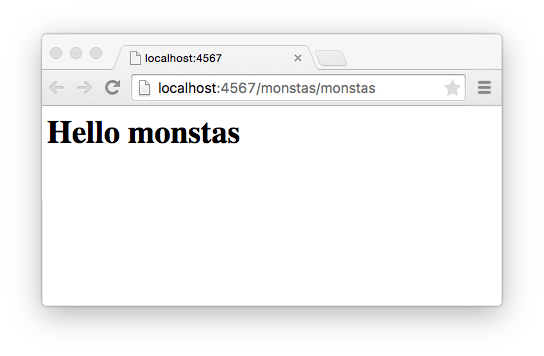Rendering templates
So far, our application does not actually return HTML, it returns just plain text.
Let’s fix that.
For this we’ll want to re-use what we’ve learned about rendering ERB templates. In order to use ERB we need to require it, define an ERB template, and make any variables used in the template known as local variables in our route:
require "sinatra"
require "erb"
get '/monstas/:name' do
ERB.new("<h1>Hello <%= params[:name] %></h1>").result(binding)
end
This code is familiar to you, isn’t it?
We get use params[:name] in the template because params is “known” in the
scope that is passed as part of the binding. The rest is just the same
as in our examples in the chapters about ERB
If you restart the server, and reload the page in your browser, it should now look like this:

Awesome, we’re now serving HTML, not just plain text.
However, Sinatra also has built-in support for ERB templates (“views”). We can
achieve exactly the same thing without spelling out the
ERB.new(...).result(binding) noise:
get '/monstas/:name' do
erb "<h1>Hello <%= name %></h1>", { :locals => { :name => params[:name] } }
end
I.e. Sinatra has a method erb that hides all the details of rendering the
template from us, and also accepts a template.
On top of this, it also accepts a hash that allows us to specify various
options. If we specify a key :locals and give it another hash, then Sinatra
will make each key/value pair on this hash available as local variables (thus
“locals”) in our ERB template.
Of course, since params already is a hash, and it already has the key name
defined, we can also just say:
get '/monstas/:name' do
erb "<h1>Hello <%= name %></h1>", { :locals => params }
end
Nice, isn’t it.